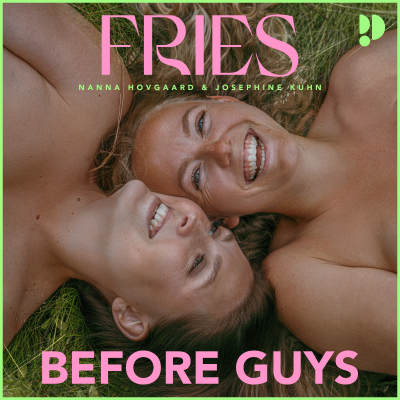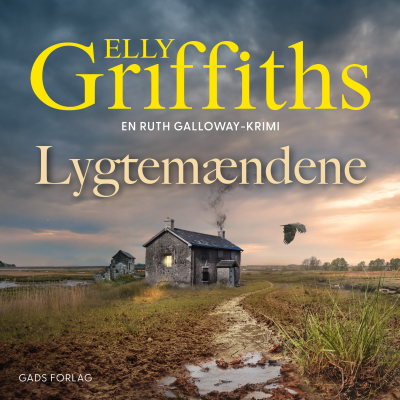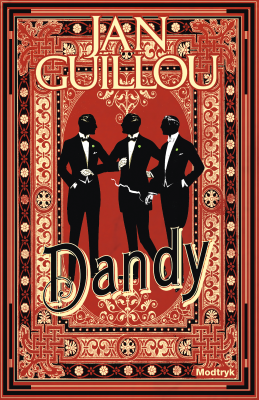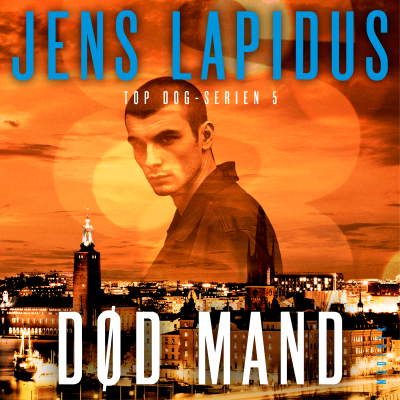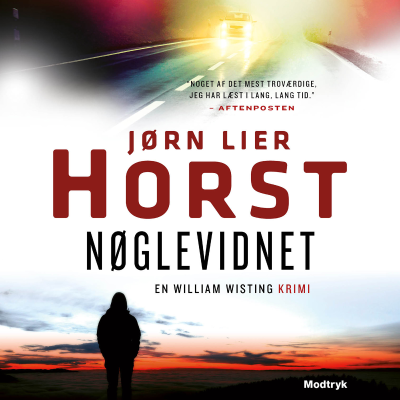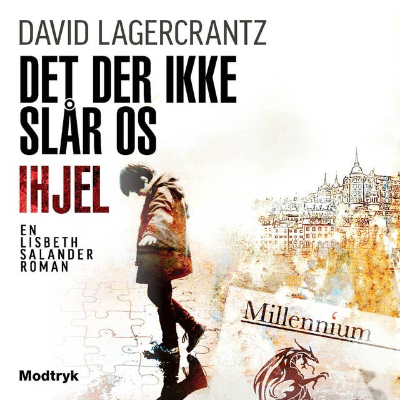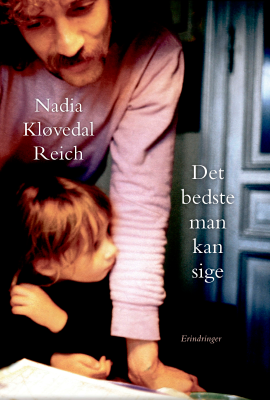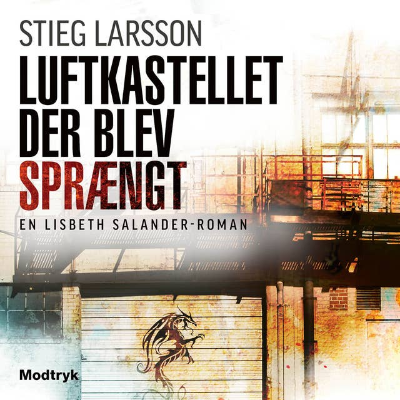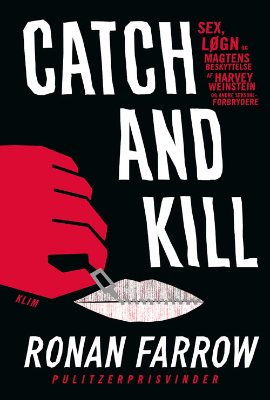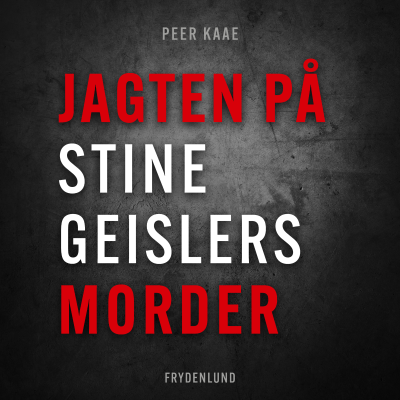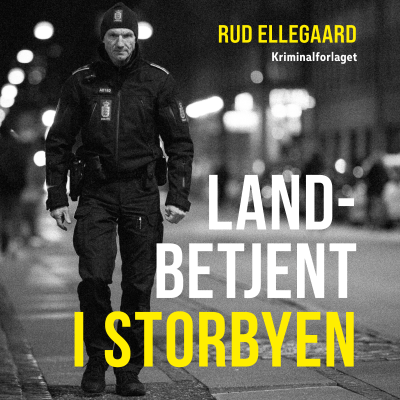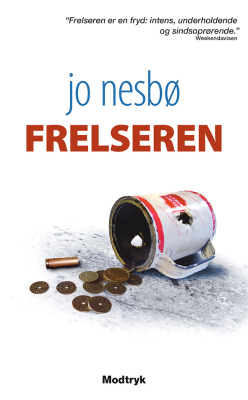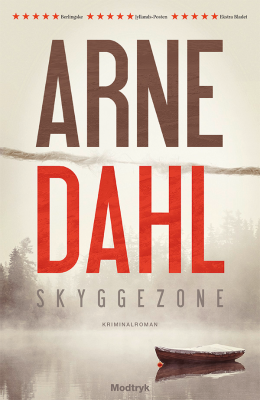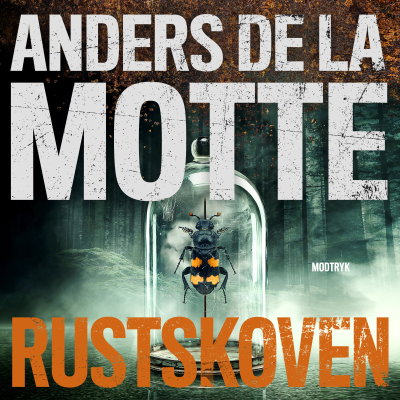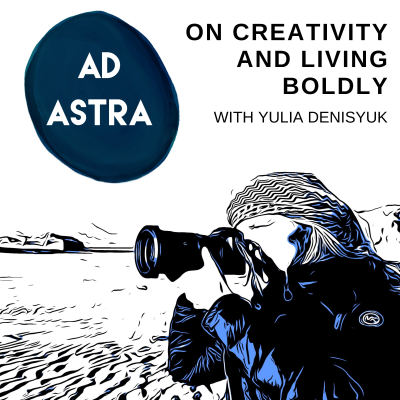
Living Boldly
Podcast af Yulia Denisyuk
Yulia Denisyuk quit her corporate job to become a published travel photographer + writer with work in Nat Geo, BBC, & more. In Ad Astra, she offers thoughts on creativity & pursuing your dreams while being human & dealing with doubts, failures, & fears. livingboldly.substack.com
Begrænset tilbud
3 måneder kun 9,00 kr.
Derefter 99,00 kr. / månedIngen binding.
Alle episoder
10 episoderI am continuing to open up paid subscription issues like this one to everyone through the end of the month, in case they may help someone deal with the challenges of the current crisis a little bit better. Dear friends, welcome to Ad Astra. It’s so wonderful to be able to welcome you here. This week, I was watching Russell Brunson [https://www.forbes.com/sites/robertadams/2017/05/16/this-entrepreneur-built-a-360-million-dollar-saas-business-and-it-was-entirely-self-funded/#5610a3cbbed3], a self-made entrepreneur and YouTuber, tell his life story in one of his videos. Russell’s high-energy (some would say aggressive) style is not something I particularly enjoy, but amidst his bombastic speech, there was a message that resonated with me (in fact, it’s a message I hear — and try to spread — often): Becoming a master is a process. Don’t expect to get good in the blink of an eye. Stories of overnight success abound on social media and in our psyches, but that thing truly doesn’t exist. To get good at something — anything — you have to spend time honing your craft. So that’s the topic I’d like to discuss today: becoming a master. “The most important possible thing you can do is do a lot of work.” By far, the question I get most often from folks is “How do I get published in National Geographic?” To me, a more appropriate question would be “What should I be doing every single day to become a master at X (where X is the thing that you most desire for yourself)?” Last I checked, there were 22,136 images in my Lightroom processing software. These are not all the images I have ever taken, nor the images I have taken in the past four years since I started on this path. These are the images that I have imported from my hard drives and edited in the past four years. That’s roughly 16 images a day, every single day, for the past four years, that I have actively worked on. The first Nat Geo assignment happened roughly 16 thousand edited images into this path. The numbers here are not important. What matters is that we do something to hone our craft consistently, over time. And that’s how we get closer to mastery. Ira Glass, a beloved host of This American Life [https://www.thisamericanlife.org/], explains this better than me: “Nobody tells people who are beginners — and I really wish somebody had told this to me — that all of us who do creative work … we get into it because we have good taste. But there’s a gap: for the first couple years that you’re making stuff, what you’re making isn’t so good, OK? It’s trying to be good, it has the ambition to be good, but it’s not quite that good. But your taste — the thing that got you into the game — your taste is still killer, and your taste is good enough that you can tell that what you’re making is kind of a disappointment to you. A lot of people never get past that phase. A lot of people at that point, they quit. And the thing I would like to say to you with all my heart is that most everybody I know who does interesting creative work, they went through a phase of yearswhere they had really good taste and they could tell what they were making wasn’t as good as they wanted it to be — they knew it fell short, it didn’t have the special thing that we wanted it to have. Everybody goes through that. And for you to go through it, if you’re going through it right now, if you’re just getting out of that phase — you gotta know it’s totally normal. And the most important possible thing you can do is do a lot of work — do a huge volume of work. Put yourself on a deadline so that every week, or every month, you know you’re going to finish one story. Because it’s only by actually going through a volume of work that you are actually going to catch up and close that gap. And the work you’re making will be as good as your ambitions. I took longer to figure out how to do this than anyone I’ve ever met. It takes a while, it’s gonna take you a while — it’s normal to take a while. And you just have tofight your way through that, okay?” Watch the full video, Ira Glass On Storytelling, here [https://vimeo.com/24715531]. I highly recommend watching it as a regular level-setting exercise for anyone with a goal of mastering a skill (it could relate to your creative work, yoga practice, or any new endeavor you’re hoping to take on). I certainly have days when I feel as if I’ll never reach mastery and that’s when I refer back to this video. You belong Even if it doesn’t feel this way right now, you belong in the space you yearn for. You have the passion, the taste, the desire to be in this field and that’s half the battle already. You might not have mastered the skill yet, but you belong. It may be hard to keep at it (as Ira Glass says, many people never get through this phase), but if you do stick with it, you will eventually start closing the gap between the great work in your vision and the actual work you produce. What can we do to help ourselves in this process? Here are some of my thoughts (let’s use photography as an example but you can apply it to many other fields): Become the connoisseur of your chosen field: look at the work of other photographers and analyze what makes it good. Become a frequent visitor of sites like LensCulture [https://www.lensculture.com/] or Aperture [https://aperture.org/]. “Consume” quality and you’ll start discerning what quality in your field looks and feels like. Practice your skill every day: you don’t have to whip out an expensive camera gear (although getting comfortable with your gear is also important), but you can take images with your phone every single day to get better (and check out #The100DayProject [https://www.the100dayproject.org/] for inspiration) Work on your impostor syndrome: You belong. Get to know people who are doing what you’d like to be doing so that you can see: they are humans just like you who likely push through their own impostor syndrome and feelings of inadequacy on a regular basis. “I never went to photography school. I don’t have any special skills. Who am I to get this assignment?” — these were my thoughts when I started working with Nat Geo. I kept reminding myself that I belong in this space. Most importantly, do not quit. Keep going on your path. Most of us quit too soon. And the ones that stay on the path eventually gain mastery in their field and reach the vision that they had imagined. Onwards, Yulia This week’s joy links: I’m reading Debunking the Myth of the 10,000-Hours Rule: What It Actually Takes to Reach Genius-Level Excellence [https://www.brainpickings.org/2014/01/22/daniel-goleman-focus-10000-hours-myth/] by Brain Pickings’ Maria Popova (lest we blindly follow the 10,000-hour rule on our road to mastery) I’m listening to Mgzavrebi [https://www.youtube.com/watch?v=uF3MXOm-Df8], a Georgian 🇬🇪 music band (bonus: scenes from sun-drenched Georgia that make you feel like you’ve just taken a trip there) I’m watchingKilling Eve [https://www.bbcamerica.com/shows/killing-eve], a bloody, sexy thriller in which two smart, powerful women face off while becoming obsessed with each other (what could go wrong?!) This is a public episode. If you would like to discuss this with other subscribers or get access to bonus episodes, visit livingboldly.substack.com [https://livingboldly.substack.com?utm_medium=podcast&utm_campaign=CTA_1]
I am continuing to open up paid subscription issues like this one to everyone through April, in case they may help someone deal with the challenges of the current crisis a little bit better. Dear friends, welcome to Ad Astra. It’s so good to have you here. This week, I struggled a bit coming up with a theme for this newsletter. I have a long list of topics to cover, but every time I’d sit down to approach any of them, no words would come out. In short, my inspiration decided to take a break. It’s normal and it happens to everyone. And yet, I couldn’t skip a week just because my inspiration was lackluster. I made a commitment to myself and to you — my readers — for weekly issues. Skipping one wasn’t an option, so I sat down to write anyway. And here, in the paragraph above, lies the answer promised to you in the subject line. (I’m experimenting again with the audio version of this newsletter. At the suggestion of a friend, I’m going to try to make it more conversational. Check out the audio version if you prefer to listen to — rather than read — your content.) The secret to reaching your dreams is commitment I often get this question in emails, DMs, and comments on social media: “How did you become a travel photographer and writer, published in great magazines, traveling for work and creating stories?” (Sometimes the question is posed like this: “Your life is a dream, how do I get one too?”) I suspect that what people want to hear in response is some sort of a “secret formula”, a “get-there-quick” action plan, a “golden ticket” to the destination of your dreams. Alas, reality is often more prosaic than that. There is no formula for becoming someone you want to be overnight. No meaningful, lasting changes happen in a blink of an eye. The truth is boring and the secret to reaching your dreams is simple: you have to commit to your path. In the years since I’ve quit my job, I’ve had many opportunities to abandon my path. At times, it felt more attractive to just give up, find another job, get a paycheck, and stop fighting for my dream life. But I guess I have issues with non-commitment. Once I’ve started something, I am compelled to see it through. And in a way, this attitude made sticking to this path a little bit easier for me. “Time is short, my strength is limited, the office is a horror, the apartment is noisy, and if a pleasant, straightforward life is not possible then one must try to wriggle through by subtle maneuvers.” — Franz Kafka I love this quote by Franz Kafka; in it lies the wisdom for reaching your dreams. Sometimes, our path is straightforward and we transition from one step to the next with ease. Other times, all we can do is wriggle through by subtle maneuvers. What matters is that we keep trying and keep moving forward, no matter how hard the path gets. Side note: when I first started on this path of becoming a travel photographer and writer, I devoured Daily Rituals: How Artists Work [https://www.amazon.com/Daily-Rituals-How-Artists-Work/dp/0307273601]. This 300-page book documents the sometimes strange, sometimes rigorous habits and practices that creative people throughout centuries — Albert Einstein, F. Scott Fitzgerald, Ayn Rand and a lot more — have employed in order to accomplish work they love. Sticking to habits, another word for commitment, largely ruled. No one becomes a professional in a chosen field overnight. In the Middle Ages, the system of apprentices learning from master craftsmen was widespread. It took a long time, often years, to become a master. And yet, the age of Instagram influencers has convinced us that we can just show up and be successful right away. No matter how many followers one has, overnight success is still a (quite harming) illusion. Commitment to your path is essential. It increases your chance for success because you’re willing to try repeatedly for a breakthrough. Elizabeth Gilbert supported herself with waitressing jobs for years before she struck gold with Eat, Pray, Love (and she called herself a writer, not a waiter, all those years). Harrison Ford struggled as a carpenter in Hollywood before becoming a star. Alan Rickman, Viola Davis, Julia Child, J.K. Rowling — the list of people who could have given up numerous times but stuck with their dreams is long and illustrious. So what does this have to do with YOUR innermost dreams and desires or with me pushing through lack of inspiration for this newsletter issue? Dream → Action → More Action → Habit → Commitment Your innermost dreams and desires will forever stay in the dreams zone unless you start taking action. (Taking action once in a blue moon doesn’t count.) You have to act consistently, over time, to create more action that turns into a habit, and later, commitment. This is the only way I know that works for reaching your dreams. That’s why I didn’t skip this issue. I’ve committed to my path and this week, I encourage you to think about what committing to your path may look like for you. Onwards, Yulia This week’s joy links: I’m reading In The Midst of Winter [https://www.amazon.com/Midst-Winter-Novel-Isabel-Allende/dp/150117813X] by Isabel Allende I’m listening toStephan Micus [https://www.youtube.com/watch?v=nS5fCxvX_yo], a German musician and composer heavily influenced by the music around the world and traditional instruments I’m watchingLast [https://www.netflix.com/title/80098047], a Korean drama (I’m on a streak!) about the underbelly world of Seoul and how small decisions can gradually turn a good man into an evil one Here’s an on-going list of pandemic relief resources: Hello Alice is offering $10,000 grants for small businesses [https://businessforall.helloalice.com/] affected by the pandemic Google is offering ad credits to small businesses [https://www.blog.google/inside-google/company-announcements/commitment-support-small-businesses-and-crisis-response-covid-19/] with active accounts The founder of Spanx is giving a$5,000 grant to 1,000 female entrepreneurs [https://www.globalgiving.org/redbackpackfund/]to help alleviate the immediate needs and support the long-term recovery of those impacted New York Foundation for the Arts has created alist of emergency grants [https://www.nyfa.org/Content/Show/Emergency%20Grants]for artists offered by various organizations TheNatGeo emergency fund for journalists [https://www.nationalgeographic.org/funding-opportunities/grants/what-we-fund/covid-19-emergency-fund/?fbclid=IwAR2neeMi0wdTVRg3K2armRYTVYAcnA8CwwfOUurEMCEhBdwKM-r4MJ1e2pc]is giving grants to journalists who provide local coverage of the pandemic (includes photographers, videographers, filmmakers and more). Here’s avery thorough list [https://covid19freelanceartistresource.wordpress.com/?ref=spelling&utm_source=Freelancers%20Union%20List&utm_campaign=99803ea792-COVID-19-Email-3-15-2020&utm_medium=email&utm_term=0_de7ca13e56-99803ea792-106512565&mc_cid=99803ea792&mc_eid=8f78a1057f]of resources crowdsourced by the Freelancers Union ranging from legal help to emergency funds to state-specific resources (thank you to Carrie fromLyman Creative [https://www.instagram.com/lymancreativeco/]for pointing this one out!) Ann Friedman (creator of Ann Friedman Weekly) is currently donating all her newsletter ad revenue to organizations or individuals whose lives and livelihoods are affected by the pandemic.You can nominate someone here [https://docs.google.com/forms/d/e/1FAIpQLSep_KA7m3Di9LPtyPDVwAj_9Y35FZYK8_-PhbL_AwuPPf05Sw/viewform]. Facebook is making $100 million in cash and ad credit grants to small businesses impacted by COVID-19. Details to come soonhere [https://www.facebook.com/business/boost/grants?fb_dtsg_ag=AQxZSo8Zq_DqaeKkm9RUB-Gt3Ve03uypVDH0EtjymaSpiQ%3AAQwgKoaDryGZKSE2Ay9zaVlWhFYdKzyB7uTqjVqi-IXpMw&jazoest=28289]. Here’s alist of financial institutions [https://www.forbes.com/sites/advisor/2020/03/12/list-of-banks-offering-relief-to-customers-affected-by-coronavirus/#4b7b226c3ee3]offering relief to customers experiencing hardship. Know of another resource I should list in the next issue? Hit reply and let me know. Finally, if you find any joy or value in this labor of love, please consider supporting it by becoming a paid subscriber below. And if you already subscribe: THANK YOU. This is a public episode. If you would like to discuss this with other subscribers or get access to bonus episodes, visit livingboldly.substack.com [https://livingboldly.substack.com?utm_medium=podcast&utm_campaign=CTA_1]
I am continuing to open up paid subscription issues like this one to everyone through April, just in case they may help someone deal with the challenges of the current crisis a little bit better. Dear friends, welcome to Ad Astra. It’s so great to have you here. For the past few weeks, I have been dealing with an issue: at random times throughout the day, I’d feel extremely sleepy and tired. So tired that sitting in front of my laptop for more than a minute would be akin to torture. I’d try to power through it, but before I knew it I’d find myself mindlessly scrolling through Facebook or skipping through Instagram Stories. No work would get done. I’d call myself a lazy bum and return to my laptop, trying to muster my concentration and focus. A few minutes later, I’d be back in the same loop. Like many around me, I’ve lost a lot of work in the past few weeks. A photo editor I’ve been discussing a project with (before this thing started) has graciously emailed to let me know that he’s been put on furlough. All of my travel projects to date have been halted, indefinitely. In this time of crisis, people who base their identity and sense of worth around the work they do (myself included) can fall into a pit. Today I’d like to discuss how we can get out of it. (Stay tuned for next week’s issue where I’ll cover ways to find creative work right now.) And if you haven’t yet, give a try to the audio version of this issue: I’ve finally figured out new software and the quality has improved quite a bit from previous episodes. Where worth comes from Across the industrial world, and especially in the United States, we’ve been made to believe that our worthiness comes not from the simple fact that we exist, but from the work we do, the money we earn, the accomplishments we can tout, and the number of hours we place on the altar of productivity. I’ve found this a terrible way to live when your sense of worth is based on some external conditions. Perhaps that’s why, through my years of travels, I’ve been inexplicably drawn to Eastern philosophies and regions of the world where ‘wasting the afternoon away’ is a common way to be (note the choice of wording for that particularly Western phrase). “I am worthy because I exist” has been a tough lesson for me to learn, but I’m slowly getting better at mastering it. (How? Keep reading.) This week, in particular, I found it soothing to listen to Krista Tippett from the On Being project ponder on this issue. You can listen to this wonderful (and short) segment here: At home, frustrated, and stressed — is 'just being' worthy right now? [https://onbeing.org/programs/living-the-questions-feel-okay-when-we-arent-doing/] Krista posits that being kind to ourselves and settling into ourselves right now is a gift we can offer to the world beyond this crisis. What a radical thought, right? (and yes, I am being sarcastic here.) You have been forced to enter empty time. The desire that drove you has relinquished. There is nothing else to do now but rest And patiently learn to receive the self You have forsaken in the race of days. … You have traveled too fast over false ground; Now your soul has come to take you back. Take refuge in your senses, open up To all the small miracles you rushed through. Become inclined to watch the way of rain When it falls slow and free. … Draw alongside the silence of stone Until its calmness can claim you. Be excessively gentle with yourself. Stay clear of those vexed in spirit. Learn to linger around someone of ease Who feels they have all the time in the world. Gradually, you will return to yourself, Having learned a new respect for your heart And the joy that dwells far within slow time. — Jonh O’Donohue Exceedingly kind This week, inspired by John O’Donohue, I made a pledge to be exceedingly kind to myself. How? Like with many issues of the mind, our transformation starts with awareness. First, we need to become aware of thoughts that enter our mind, then we practice redirecting them, substituting negative ones with better options. I found morning meditation to be an incredibly helpful tool. I've been meditating daily since last summer and in the past week, I’ve switched the focus of my meditations to practicing self-kindness. (I touch on the subjects of awareness and meditation here [https://adastra.substack.com/p/issue-2-does-visualization-work], here [https://adastra.substack.com/p/issue-6-taming-the-self-doubt-dragon], and here [https://adastra.substack.com/p/issue-7-how-abundance-mindset-subtly].) After I meditate, I write down the message I want to remember on a piece of post-it. Throughout the day, I return to it often and it helps me keep the focus on this intention. Here are my messages from this week: And please note, this language — “I love you,” “My love,” “You’re doing the best you can” — is NOT natural to me. My tendency is to engage in negative self-talk. But even after a week of doing this consistently, I’m feeling the soothing effect and, most importantly, I am starting to change how I talk to myself throughout the day. Finally, this week I gave in to the urge to rest. I took a nap at 1 pm this Wednesday and another one at 3 pm on Thursday. And I didn’t feel guilty about either of them. I’ve realized that my body is smarter than I am and in this time of crisis, I need to follow its lead. I (mostly) don’t feel bad about not being productive all the time [https://www.nytimes.com/2020/04/01/style/productivity-coronavirus.html] and I’m hoping to bring this practice of self-kindness forward when this particular crisis is over. So, here is my wish for you this week: See if you can bring a little bit more self-kindness into your days. We are all dealing with many issues right now, ranging from anxiety to fear to sadness to the very real loss of income, and health, and well-being. Let’s be kind to ourselves. We are worthy. Onwards, Yulia This week’s joy links: I’m reading This Is How You Lose the Time War [https://www.amazon.com/This-How-You-Lose-Time/dp/1534431004] by Amal El-Mohtar and Max Gladstone I’m listening to Anouar Brahem [https://vimeo.com/17746085], a Tunisian oud player and composer I’m watching Chocolate [https://www.netflix.com/title/81193313], a Korean drama about food and healing Disclaimer: I know I have privilege. I am able to work from home, safely, while many others cannot afford to do that. If you or someone you know is struggling, know that you are not alone. Here’s an on-going list of resources I’ve found so far: The NatGeo emergency fund for journalists [https://www.nationalgeographic.org/funding-opportunities/grants/what-we-fund/covid-19-emergency-fund/?fbclid=IwAR2neeMi0wdTVRg3K2armRYTVYAcnA8CwwfOUurEMCEhBdwKM-r4MJ1e2pc] is giving grants to journalists who provide local coverage of the pandemic (includes photographers, videographers, filmmakers and more). Freelancers Relief Fund [https://www.freelancersunion.org/resources/freelancers-relief-fund/] is offering financial assistance to cover essential expenses like food, utility payments, etc. Here’s avery thorough list [https://covid19freelanceartistresource.wordpress.com/?ref=spelling&utm_source=Freelancers%20Union%20List&utm_campaign=99803ea792-COVID-19-Email-3-15-2020&utm_medium=email&utm_term=0_de7ca13e56-99803ea792-106512565&mc_cid=99803ea792&mc_eid=8f78a1057f]of resources crowdsourced by the Freelancers Union ranging from legal help to emergency funds to state-specific resources (thank you to Carrie fromLyman Creative [https://www.instagram.com/lymancreativeco/]for pointing this one out!) Ann Friedman (creator of Ann Friedman Weekly) is currently donating all her newsletter ad revenue to organizations or individuals whose lives and livelihoods are affected by the pandemic.You can nominate someone here [https://docs.google.com/forms/d/e/1FAIpQLSep_KA7m3Di9LPtyPDVwAj_9Y35FZYK8_-PhbL_AwuPPf05Sw/viewform]. Facebook is making $100 million in cash and ad credit grants to small businesses impacted by COVID-19. Details to come soonhere [https://www.facebook.com/business/boost/grants?fb_dtsg_ag=AQxZSo8Zq_DqaeKkm9RUB-Gt3Ve03uypVDH0EtjymaSpiQ%3AAQwgKoaDryGZKSE2Ay9zaVlWhFYdKzyB7uTqjVqi-IXpMw&jazoest=28289]. Here’s alist of financial institutions [https://www.forbes.com/sites/advisor/2020/03/12/list-of-banks-offering-relief-to-customers-affected-by-coronavirus/#4b7b226c3ee3]offering relief to customers experiencing hardship. Know of another resource I should list in the next issue? Hit reply and let me know. Finally, if you find any joy or value in this labor of love, please consider supporting it by becoming a paid subscriber below. And if you already subscribe: THANK YOU. This is a public episode. If you would like to discuss this with other subscribers or get access to bonus episodes, visit livingboldly.substack.com [https://livingboldly.substack.com?utm_medium=podcast&utm_campaign=CTA_1]
Dear friends, welcome to Ad Astra. I’m so glad you’re here. For this week’s issue, I decided to get away from it all: the C-word, the news, the anxiety, and the flood of advice on how to work from home, how to be productive during quarantine time, how to quell your worry, or how to wash your hands. Instead, I’d like to share with you a story I wrote in 2015 when I was on the verge of quitting corporate (in fact I wrote it exactly nine months before I quit). One year later, this story was picked up by Lonely Planet for their annual travel anthology (you can see it here [https://www.amazon.com/gp/product/178657196X/ref=as_li_tl?camp=1789&creative=9325&creativeASIN=178657196X&ie=UTF8&linkCode=as2&linkId=ad081a73d75eaa2a7ddc704b4397ecee&tag=yuliadenisyuk-20]). Without further ado, I present to you “The Night Is Young.” The Night Is Young My guide Mohammed dismounts his camel, takes off his worn leather sandals and steps on the hot desert sand. The onset of dusk is adding a hint of sorcery to the dunes that loom all around us and I can no longer see the homes of Merzouga village behind the rare Saharan palms. I cling to my camel, Bob Marley, and follow Mohammed into the desert for an overnight stay. Bob Marley’s flesh is hot against my skin. The sun is still strong and I am grateful for the elaborate red-cloth turban Mohammed tied on my head a minute ago. Through the narrow slit in the turban, I track Mohammed’s indigo tunic, lit in the ochre dunes, as he guides us deeper into this land. I lose sight of him when we cross a large dune — a sleeping giant — and realize that a camel thread in Mohammed’s hand is the only tie connecting me to another human. I have to believe that the thread is strong enough. Bob Marley takes careful steps, sinking to his knees but coming back out each time. After a while, the camel and I get into an ancient rhythm, advancing as one through the desert. The quiet dunes surround our small caravan and at times seem to cover us whole. Still, we keep going. Mohammed gazes far beyond the horizon and charges ahead as if an invisible path were etched into the dunes. I catch the last glimpse of the sun before the next slanted dune hides it from view. The air cools down and my camel perks up. The night is quickly falling on the Sahara and Mohammed’s slim silhouette is dissolving into the darkness. I pull on the camel thread to ensure we are still connected. As if he is sensing my fear, Mohammed turns and sends me a bright wide grin. He must be only a kid, eighteen or twenty at most. I realize I don’t know much about him, except that his family lives in a nearby village. By the time I go back to New York, he’ll take ten other people on this nightly trek. I too will have business to attend to upon my return, an unfinished conversation. It began years ago when I started my corporate career and soon recognized this path was not right for me. Unhappy with my status quo but afraid to change it, I continued working and tormenting myself and my loved ones for years. At last, one mild spring night in New York a close friend had asked me, “Why are you wasting your years on something you do not care for?” The question hung unanswered that night but kept simmering in my mind all the way to the African continent. Mohammed suddenly breaks the silence with his first words to me, “Algerian border.” He points somewhere far, smiles, and says it again, “Algerian border, there. We are close.” Ten minutes later our caravan stops at a low valley formed by a circle of barely visible dunes. I say good night to Bob Marley as Mohammed helps me dismantle. The camel, unfazed by my good manners, lies down for the night and we step into the dark. The sand is now cool to the touch, a welcomed change from the earlier furnace. I drop my bags and run up the nearest dune. There, on top of the mound, the first star of the night emerges into view. In vain, I try to decipher its elusive flickering message and finally go back down. Below, Mohammed unhurriedly tends to a fire, looking graceful and fragile at once. I half expect him to turn around and tell me, “You become responsible, forever, for what you have tamed.” Instead, he pours me a hot cup of tea — ‘Berber whiskey’ — a mixture of fresh mint leaves and odd mountain herbs that grow in the nearby mid-Atlas mountains. The tea soothes my body, sore from the two-hour trek across the shifting dunes. Mohammed takes out a large cylinder drum from Allah knows where and starts humming a simple tune, gently at first, but louder and louder with each rhythm. Zamaza, zamaza A-zibi-bauwi-zibiba Asalam-aleykum a mama Asalam-aleykum a baba Zamaza, zamaza A-zibi-bauwi-zibiba I pick up another drum, smaller in size, and join in. Zamaza, zamaza A-zibi-bauwi-zibiba Asalam-aleykum a mama Asalam-aleykum a baba Zamaza, zamaza A-zibi-bauwi-zibiba Mohammed pours me more tea and I look up at the skies. The earlier single star of the night has bloomed into a plentiful garden of light, with myriads of tiny and large constellations weaved into one bright carpet. This richness of space, lost on the city dwellers, is re-igniting a fire I thought to be almost dead. I run back up to the dune and throw up my hands. “Fearless,” I whisper. “Be fearless.” Oceans away, I finally say out loud what I could not bear to speak of before. I am afraid to drop all the piled up expectations. I am afraid to fail. I am afraid to be vulnerable with my life. Driven by fear, I continue to make choices that steer me away from all that is risky and grand — creativity, freedom, passion. I have become a passenger in my life, watching the years unfold to someone else’s scenario. The stars keep shining as I cry and fall into the sand. My fear, acknowledged, quietly walks off the dune. Some minutes later, I find Mohammed sitting atop the same dune, his face barely visible under his heavy turban. Only his eyes are alight, twinkling as they reflect the lights of the fire below. We sit together in silence for a while, surrounded by stars, and then start our descent. As we slide down, Mohammed offers his second and last words of the night to me. “The night is young,” he says. The night is young. Onwards, Yulia This is a public episode. If you would like to discuss this with other subscribers or get access to bonus episodes, visit livingboldly.substack.com [https://livingboldly.substack.com?utm_medium=podcast&utm_campaign=CTA_1]
This issue (part of the paid subscription) is open to everyone, just in case it may help someone deal with the challenges of the upcoming weeks a little bit better. Hi friends, welcome to Ad Astra. It’s so wonderful to have you here. You’ve likely seen this sentiment going around the internet this week: It’s been surreal to see our lives grind to a halt as we all watch this pandemic march through the globe. I hope you’re taking care of yourself and your loved ones and staying safe. We don’t know how long this period will last, so let’s try not to waste our strength on feeling anxious, fearful, or angry. This, too, shall pass, one way or another. Love, compassion, and level-headed behavior is what we need right now. This week, I had a strange realization: this crisis is exactly what my fears have warned me about when they told me to stay at my stable job, hunker down, and forget about my dreams. It’s surreal. Usually, our worst fears don’t come true. But when the travel industry — and with it, the rest of the world — has stopped operating in a matter of days, MY worst fears did realize. As a travel photographer and writer who also leads other people on trips, this is my worst-case scenario. I’ve had several work trip assignments canceled, the bookings for my travel company are up in the air, and it’s unclear how the industry as a whole will recover. A freelance travel journalist’s income is haphazard at best during normal times and right now, it’s nonexistent. So why do I feel so calm? How am I able to carry on while my industry is on fire? This is what I’d like to cover today. Under pressure There’s a part of my life I rarely talk about that, I believe, has prepared me well for this time. It’s the reason I can pursue risks with less fear. It’s why I keep calm in situations of stress and anxiety. Back when I was a green 21-year-old, I joined the US military, specifically the Navy. And while there were a lot of challenges and hardships associated with my service (someday I’ll get into that), the Navy taught me how to operate under extreme pressure. In the Navy, I was part of an expeditionary aviation unit where every day we launched our pilots up in the air in old flying machines from the 1960s. One wrong part installed, one inspection step missed, and our pilots could die. So we followed processes to the proverbial t. We had checklists and SOPs (Standard Operating Procedures) for everything you could think of, and we trained, trained, trained every single day. Why did we train so much? Because after all that training came the time for us to deploy and actually execute what we trained for, in even more stressful conditions. In my four years of service, I spent two and a half years training in Washington State and one and a half year deployed to Iraq and Afghanistan during the global war on terror campaign of the early 2000s. You may wonder, “What does this all have to do with me and the uncertainty I face at the beginning of 2020?” What I’d like to propose to you is that this pandemic and the disruption it’s likely bringing to your doorstep is akin to deployment for military personnel. Both are stressful. Both are scary. And both can be prepared for, physically and mentally. In the spirit of my Navy times, I offer you my version of a deployment checklist (yes, that was a real thing we used) below. I hope that this checklist can help you feel a little bit better about the current situation and perhaps prepare for the next time uncertainty hits. 1. Get your bare minimum During our Iraq deployments, we often experienced sand storms. These were weird moments when the daytime sky went dark from all the sand that a strong wind called shamal brought over the land. When you’re in the middle of a storm that can last for days, you take everything down to a bare minimum. Food, shelter, medicine, clothes — check. If you have that covered, you’re already doing better than so many people on earth. 2. Assess your rainy-day fund If you’re a freelancer like me, do you have your rainy-day fund? How is it looking? Perhaps right now it’s not possible, but when the storm subsides, can you find other sources of income that you can rely on? What other skills can you offer that are related to your main area of expertise? Here are a few of the skills I earn with when the travel assignments dwindle: social media management, graphic design, copywriting, marketing consulting, and website development. We all know something that can be useful for other people. And if you’re struggling to identify what that might be in your case, consider enlisting the help of your friends or people in your network. Sometimes they can see what you can’t and can offer great insights into your skillset. (And if you’d like, reply to this newsletter and we can brainstorm your situation together, too.) 3. Use this time as an opportunity to downsize Every time the deployment loomed over me, I went through the process of downsizing my life. Because our deployments usually lasted 6-8 months, they caused significant disruptions. What should I do with my rental apartment? Where do I store my car? What do I do with all my stuff? I love this quote by Glennon Doyle that reframes the time of crisis and disruption as a gift. You have been offered "the gift of crisis." As Kathleen Norris reminds us, the Greek root of the word crisis is "to sift," as in, to shake out the excesses and leave only what's important. That's what crises do. They shake things up until we are forced to hold on to only what matters most. The rest falls away. — Glennon Doyle If your bare minimums are taken care of and if you’re able to keep earning for a roof over your head, consider using this strange time to reassess … well, everything in your life. As we’re forced to stop going out, shopping, spending money on entertainment, and following our routines, this could be a way for us to find a new (and improved) normal. The lockdown could help you identify what you truly need to keep spending on and perhaps reach your financial goals faster. (The only thing I won’t cut is my vino fund… but everything else is up for grabs right now!) The social distancing could help you realize that some people in your network were influencing you in a negative way and give you a good excuse to limit the interaction. The quarantine could help you understand what simple things make you happy and find ways to experience them more often in your day. The opportunities here are endless… and the perspective you use to go through this difficult time is crucial. We may be inside of a storm right now, but every storm, ever, in the history of this planet, has eventually ended. This one will end as well. Onwards, Yulia “The world is always going to be dangerous, and people get badly banged up, but how can there be more meaning than helping one another stand up in a wind and stay warm?” — Anne Lamott ⬆️ Much Loved [https://www.marknixon.com/much-loved], a photo project by Mark Nixon documenting childhood toys loved down to bare threads Disclaimer: I know I belong to the privileged part of society. I am able to work from home, safely, while many others right now cannot afford to do that. If you or someone you know is struggling, know that you are not alone. There are resources available and I’ve listed just a few below: Here’s a very thorough list [https://covid19freelanceartistresource.wordpress.com/?ref=spelling&utm_source=Freelancers%20Union%20List&utm_campaign=99803ea792-COVID-19-Email-3-15-2020&utm_medium=email&utm_term=0_de7ca13e56-99803ea792-106512565&mc_cid=99803ea792&mc_eid=8f78a1057f] of resources crowdsourced by the Freelancers Union ranging from legal help to emergency funds to state-specific resources (thank you to Carrie from Lyman Creative [https://www.instagram.com/lymancreativeco/] for pointing this one out!) Ann Friedman (creator of Ann Friedman Weekly) is currently donating all her newsletter ad revenue to organizations or individuals whose lives and livelihoods are affected by the pandemic. You can nominate someone here [https://docs.google.com/forms/d/e/1FAIpQLSep_KA7m3Di9LPtyPDVwAj_9Y35FZYK8_-PhbL_AwuPPf05Sw/viewform]. Facebook is making $100 million in cash and ad credit grants to small businesses impacted by COVID-19. Details to come soon here [https://www.facebook.com/business/boost/grants?fb_dtsg_ag=AQxZSo8Zq_DqaeKkm9RUB-Gt3Ve03uypVDH0EtjymaSpiQ%3AAQwgKoaDryGZKSE2Ay9zaVlWhFYdKzyB7uTqjVqi-IXpMw&jazoest=28289]. Here’s a list of financial institutions [https://www.forbes.com/sites/advisor/2020/03/12/list-of-banks-offering-relief-to-customers-affected-by-coronavirus/#4b7b226c3ee3] offering relief to customers experiencing hardship. Know of another resource I should list in the next issue? Hit reply and let me know. Finally, if you find any joy or value in this labor of love, please consider supporting it by becoming a paid subscriber below. And if you already subscribe: THANK YOU. This is a public episode. If you would like to discuss this with other subscribers or get access to bonus episodes, visit livingboldly.substack.com [https://livingboldly.substack.com?utm_medium=podcast&utm_campaign=CTA_1]
Begrænset tilbud
3 måneder kun 9,00 kr.
Derefter 99,00 kr. / månedIngen binding.
Eksklusive podcasts
Uden reklamer
Gratis podcasts
Lydbøger
20 timer / måned

